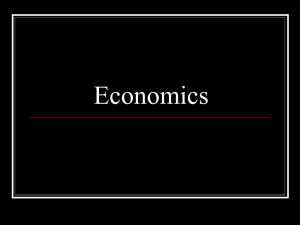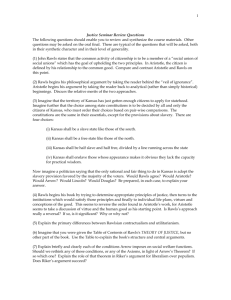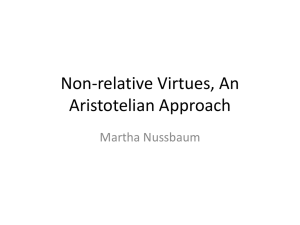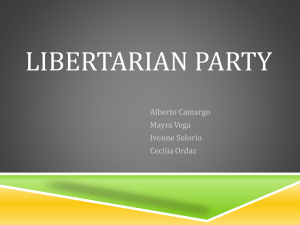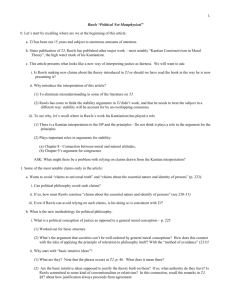here
advertisement
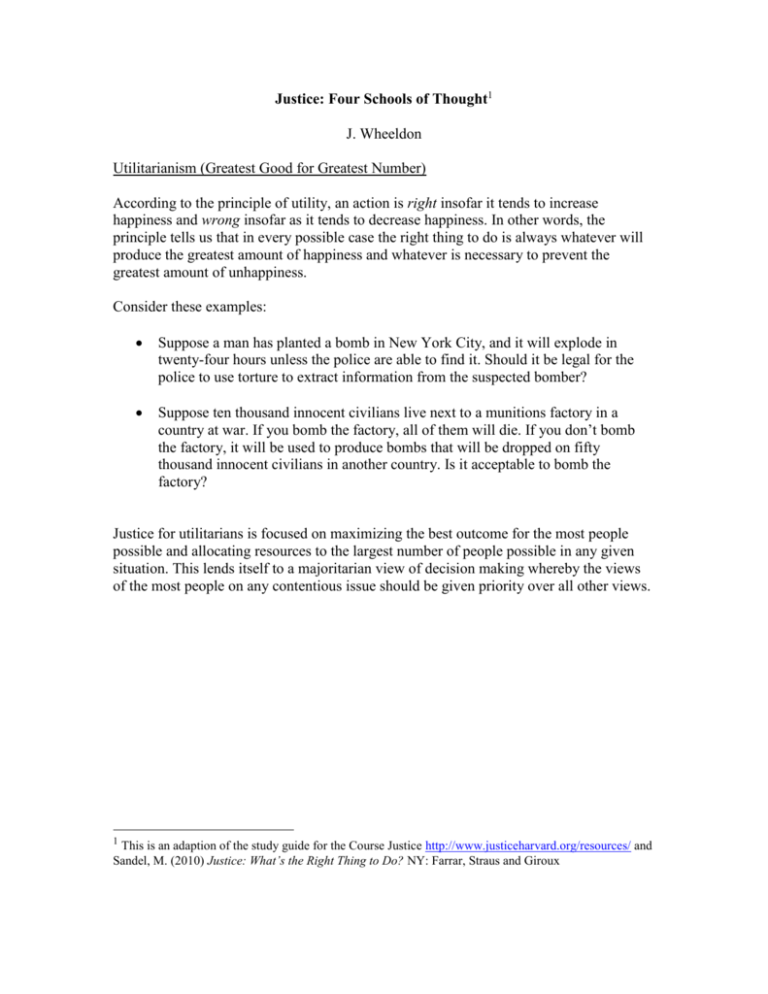
Justice: Four Schools of Thought1 J. Wheeldon Utilitarianism (Greatest Good for Greatest Number) According to the principle of utility, an action is right insofar it tends to increase happiness and wrong insofar as it tends to decrease happiness. In other words, the principle tells us that in every possible case the right thing to do is always whatever will produce the greatest amount of happiness and whatever is necessary to prevent the greatest amount of unhappiness. Consider these examples: Suppose a man has planted a bomb in New York City, and it will explode in twenty-four hours unless the police are able to find it. Should it be legal for the police to use torture to extract information from the suspected bomber? Suppose ten thousand innocent civilians live next to a munitions factory in a country at war. If you bomb the factory, all of them will die. If you don’t bomb the factory, it will be used to produce bombs that will be dropped on fifty thousand innocent civilians in another country. Is it acceptable to bomb the factory? Justice for utilitarians is focused on maximizing the best outcome for the most people possible and allocating resources to the largest number of people possible in any given situation. This lends itself to a majoritarian view of decision making whereby the views of the most people on any contentious issue should be given priority over all other views. 1 This is an adaption of the study guide for the Course Justice http://www.justiceharvard.org/resources/ and Sandel, M. (2010) Justice: What’s the Right Thing to Do? NY: Farrar, Straus and Giroux Libertarianism (Freedom and Property) According to libertarians, individual rights (including property rights) are paramount. Many believe the greatest threat to individual rights comes from the government. You should be able to drive without a seat belt if you want. The government has no business giving you a ticket. That’s unacceptably paternalist. And if you want to use drugs or engage in deviant sexual practices, you should be free to do so, provided you don’t violate anyone else’s rights in the process. The government has no business passing moralistic legislation. It shouldn’t tell you how to live your life. Most importantly, the government should never tax for redistributive purposes. Redistributive taxation is theft according to libertarians and amounts to forcing you to work for those people. Consider these examples: In the American Civil War, men who were drafted into the army had the option of hiring a substitute to take their place and avoid military service. Is this substitution policy tantamount to selling off one’s duty as a citizen Imagine a new surrogacy service. Well off mothers who could carry a baby to term choose for their own convenience to avoid the difficulties of giving birth and hire poor women from developing countries to carry babies in their wombs. Is it wrong for well off women to rent the wombs of less well off women from poorer countries? Justice for libertarians is focused on ensuring individual rights are protected and allocating resources in ways that protect the right of individuals to make their own choices. This lends to the view that the majority view while important should not be used to justify the violation of core individual rights Egalitarianism (Distributive Justice) Egalitarianism or distributive justice is based on the idea that justice requires that everyone can participate equally in civic and political life. According to the philosopher John Rawls, principles of justice are those that we would all agree to if we were choosing rules for our society and no one had any unfair bargaining power. Just rules are those that whatever principles we would agreed to behind a “veil of ignorance,” where no one knows his or her age, sex, race, intelligence, strength, social position, family wealth, religion, or even life goals. Rawls thinks if we were unaware of these particular facts about ourselves, we would not propose social rules designed to give ourselves an unfair advantage over other people. Rawls thinks that two sorts of principles would be agreed to behind the veil of ignorance. The first is focuses on the same set of basic liberties, including the freedoms of speech and conscience, the right to hold office and to vote for elected officials, freedom from arbitrary arrest, the right to hold personal property, and so on. The second focuses on ensuring that any inequity that did exist would make even the least advantaged members of society better off. Consider these examples: Healthcare reform is designed to lower costs by bringing more people into the system. Some suggest the proposed reforms will benefit more Americans than they will harm and should be enacted, while others suggest these reforms undermine freedom and the personal responsibility for people to take care of themselves. If current health policies harm the poor by making it difficult to get quality and affordable healthcare then the current reforms could be seen as the first step in a longer process. Do you agree? In 2003, the New Haven fire department administered a test to rank candidates for promotion. When none of the African-American firefighters scored high enough to be considered for promotion, the fire department chose to invalidate the test results. The white and Hispanic firefighters then sued the fire department. The US Supreme Court decided that the fire department had engaged in wrongful racial discrimination by invalidating the test results. Do you think that the Court made the right decision? Justice for Egalitarians considers basic equality for all by focusing on the relative position of each person in society based on the historical discrimination faced by some based on age, gender, ethnicity, ability, and sexual orientation. On this view, debates of justice must always consider and ideally accommodate minority views. Virtue Ethics (Just Desserts) Virtue ethics is associated with the Greek philosopher Aristotle and the idea justice means giving each person their due, or what she/he deserves. Aristotle suggests we can determine this by considering the telos—the end or the purpose—of the thing in question. Once we have defined the purpose of a good, an institution, or even a person, justice involves ensuring that those who are best able to fulfill the purpose of something should get priority. This method of reasoning about justice asks us to start from the purpose of the thing to decide, and then decide who is best placed to fulfill this purpose. Consider these examples: The Ku Klux Klan is an association founded with the intention of harassing and even killing African American, Jewish, Hispanic and other minority citizens. Consider Aristotle’s method of thinking about justice. Is justice really about ensuring those who are best able to harass minorities achieve membership and leadership in the KKK? Recent Supreme Court decisions suggest the acceptance of same sex marriage is growing and legal barriers to these unions are unconstitutional. While a majority of Americans and large majority of younger Americans see same sex marriage as acceptable and laws against it should be repealed, some argue that the purpose of marriage is procreation. Since that is not possible in same sex marriages, they will never be “real” marriages. Do you agree? Justice for those who embrace virtue ethics focuses the idea that people should do the right thing for the right reasons. This means resources should be allocated to those who deserve them the most. On this view debates on contentious issues should be resolved by prioritizing the views of subject matter experts.

